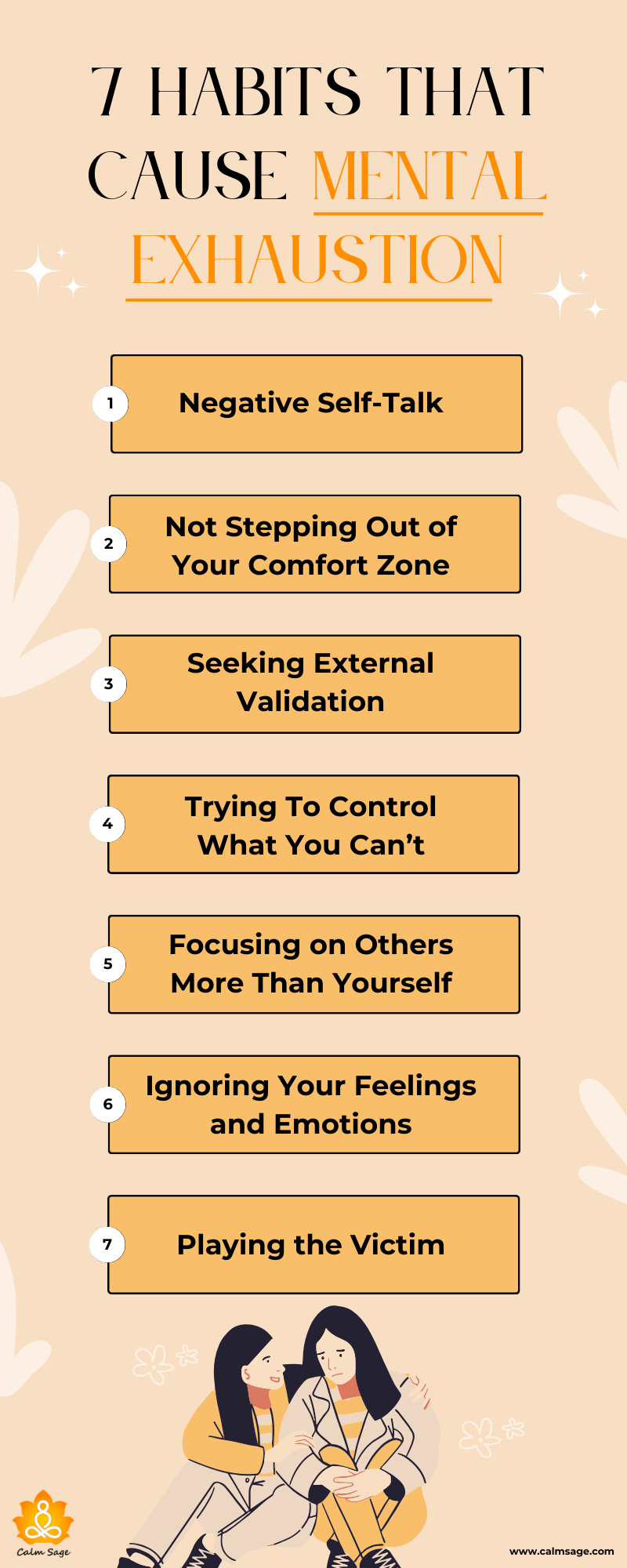7 Habits That Lead to Mental Weakness (And How to Break Free)

Have you ever wondered what makes some people stronger and more capable than others? Why can these people seem to handle life’s ups and downs with grace, while others seem to crumble when the slightest breeze blows? I have seen these people in my life, and I am always left amazed at their resilience. Is it luck or something else that drives them to be mentally stronger than others?
Mental strength or weakness is often the result of your habits and mindset. Simply put, when I talk about mental weakness, I refer to the lack of resilience, the inability to cope with stress, or the inability to face setbacks with confidence.
If you’re mentally or emotionally weak, then this state of mind can be characterized by feelings of powerlessness, pessimism, and a sense of being overwhelmed by life’s ups and downs, rather quickly.
So, what exactly causes mental exhaustion or mental weakness? Let’s take a look at the habits that make you mentally weak.
7 Habits That Cause Mental Weakness
1. Negative Self-Talk
Constantly talking negatively to yourself can chip away at your mental strength and leave you emotionally and mentally weakened. Whether it’s criticizing your abilities, appearance, or self-worth, negative self-talk can reinforce feelings of inadequacy and contribute to poor self-confidence.
For example, if you constantly tell yourself, “I am not good enough” then you’re just creating a mindset for yourself to fail.
2. Not Stepping Out of Your Comfort Zone
Stepping out of your comfort zone means growth, but if you continue to avoid changing or moving out of what you feel is comfortable, then you can be stuck in a loop of insecurities and fear. This stagnation can drive you to feel inadequate and insecure, only adding to your mental weakness. This can mean avoiding difficult conversations or procrastinating your tasks.
3. Seeking External Validation
If you constantly rely on external validation to feel worthy or self-confident, then you’re only setting yourself up for disappointment and dependency. While it’s OK to seek approval from others, constantly depending on their validation can make you vulnerable to criticism and undermine your self-worth. For example, constantly fishing for compliments can leave you feeling empty and insecure when it’s not forthcoming.
4. Trying To Control What You Can’t
Another habit of mental weakness is wasting time worrying about things that are not in your control. If you always try to control things out of your control, then it can leave your mental resources down to zero and will make you feel powerless. Whether it’s obsessing over past mistakes or worrying about the future, focusing on what you can’t control only adds to feelings of anxiety and helplessness.
5. Focusing on Others More Than Yourself
What makes a person mentally weak is that they always compare themselves with others. If you do that, then you are creating a breeding ground for resentment and inadequacy. Whether it’s comparing careers, relationships, or physical appearances, this habit can lower your self-esteem and leave you feeling empty inside.
6. Ignoring Your Feelings and Emotions
Suppressing your emotions is another habit of a mentally weak person that you shouldn’t ignore. When you suppress your emotions and feelings, it can lead to emotional numbness and detachment. Whether it’s using unhealthy coping mechanisms, consciously numbing yourself to emotions, or creating a facade of stoicism, it’s ignoring your emotions and feelings that hold you back from healing.
7. Playing The Victim
Having a victim mentality is another habit of a mentally weak person. When you play the victim, you consciously shift the blame for your circumstances onto other factors, which can rob you of your mental resilience. Whether it’s blaming others for your failures or having a pity party, playing the victim keeps you in a loop of negativity and powerlessness.
How to Overcome Mental Exhaustion?
1. Be Self-Compassionate:
Instead of criticizing yourself for your mistakes, have some self-compassion and treat yourself with kindness and understanding. Replace self-criticism with self-encouragement and see how that changes your mindset!
2. Go For Challenges:
Make it a habit of stepping out of your comfort zone and trying something that feels like a challenge. You can try a new hobby, take on a new project, or just talk about that difficult topic you’ve been ignoring. This can help build your confidence.
3. Validate Yourself:
Focus on self-validation for better self-worth instead of relying on external validation. Celebrate small successes and remind yourself about your strengths and qualities that make you…YOU!
4. Take Control of What You Can:
Instead of directing your mental energy on things you can’t control, try to focus on what you can. Your attitude, your actions, or your responses — pay attention to them. Let go of the need to control everything. Sometimes, surprises are good!
5. Be Grateful:
Have a mindset of gratitude by regularly reflecting on what you’re most grateful for. Practice gratitude and try to shift your focus from what you don’t have to what you have. This can create a sense of contentment and say bye-bye to mental weakness.
6. Honor Your Feelings:
Allow yourself to experience and express your emotions fully. Whether they are negative or positive, express them, and experience them. Let yourself be in tune with your feelings without judging them. This will help you become self-aware and confident in your feelings.

Wrap Up…
Breaking free from habits that lead to mental weakness might need some conscious effort and commitment from your side, but the rewards will be worth it. By knowing what causes your mental weakness, you can create a better understanding of how to gain your mental strength back. Remember, true strength isn’t in avoiding things, but in embracing what comes your way with courage and compassion.
So, are you ready to break free from mental weakness? Go on with these practices to live a fulfilled life. I hope this article helped you learn the habits of a mentally weak person and how to break free from these habits. Let us know your thoughts in the comments below.
Take care, stay strong, and keep thriving!




















